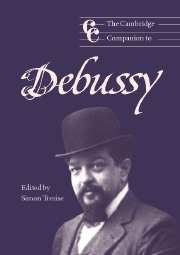14 - Debussy now
from Part IV - Performance and assessment
Published online by Cambridge University Press: 28 September 2011
Summary
The process of interpreting any great composer from the past whose music remains a vital force on the contemporary scene is, inevitably, multivalent: performers, scholars and composers all make their contributions to preserving that vitality, that presence. Moreover, the activities of scholars and composers, the prime concern of this essay, proliferate to offer further, diverse levels of discourse and response. In the case of scholarship – informed writing about music – there is a whole range of distinct though interacting theories and techniques, from matters of performance practice and the ‘genetic’ studies basic to historical musicology to various, often radically contrasted, types of technical analysis and hermeneutic commentary. The focus of my discussion here is the current state of Debussy interpretation from the formal and hermeneutic perspectives of theory and analysis as well as of composition, for, as will soon be evident, these points on the interpretative chain cannot easily be separated, especially when the thorny topics of Debussy's influence on, or affinity with, other composers become involved.
This is not the place for an account of the thinking and terminology that informed the analytical interpretation of Debussy during the first half of the twentieth century. But it is clear that the issues present-day musicology often addresses – how ‘tonal’ was Debussy's musical language, given its use of whole-tone, pentatonic and octatonic modal elements? how traditional, or organicist, was his attitude to form? How innovative was the expressive ‘tone’ of his music? – can all be found, however informally defined, in earlier years: for example, in Constant Lambert's Music Ho!, first published in 1934.
- Type
- Chapter
- Information
- The Cambridge Companion to Debussy , pp. 278 - 287Publisher: Cambridge University PressPrint publication year: 2003



